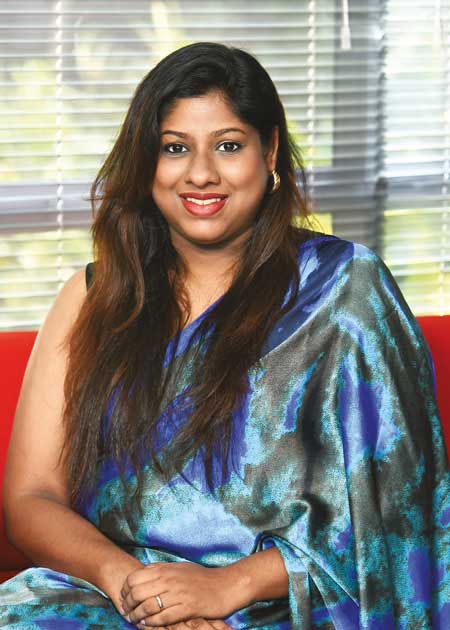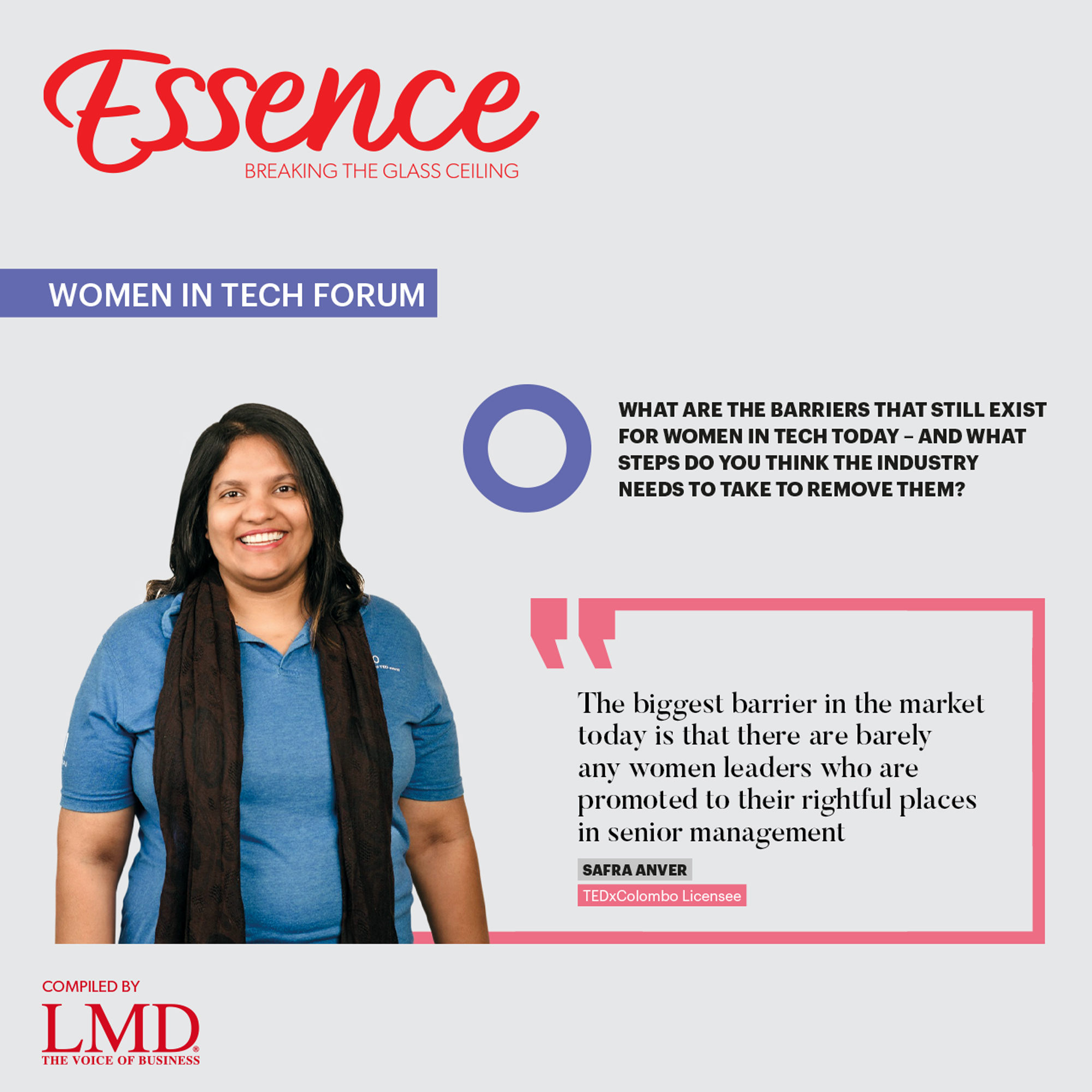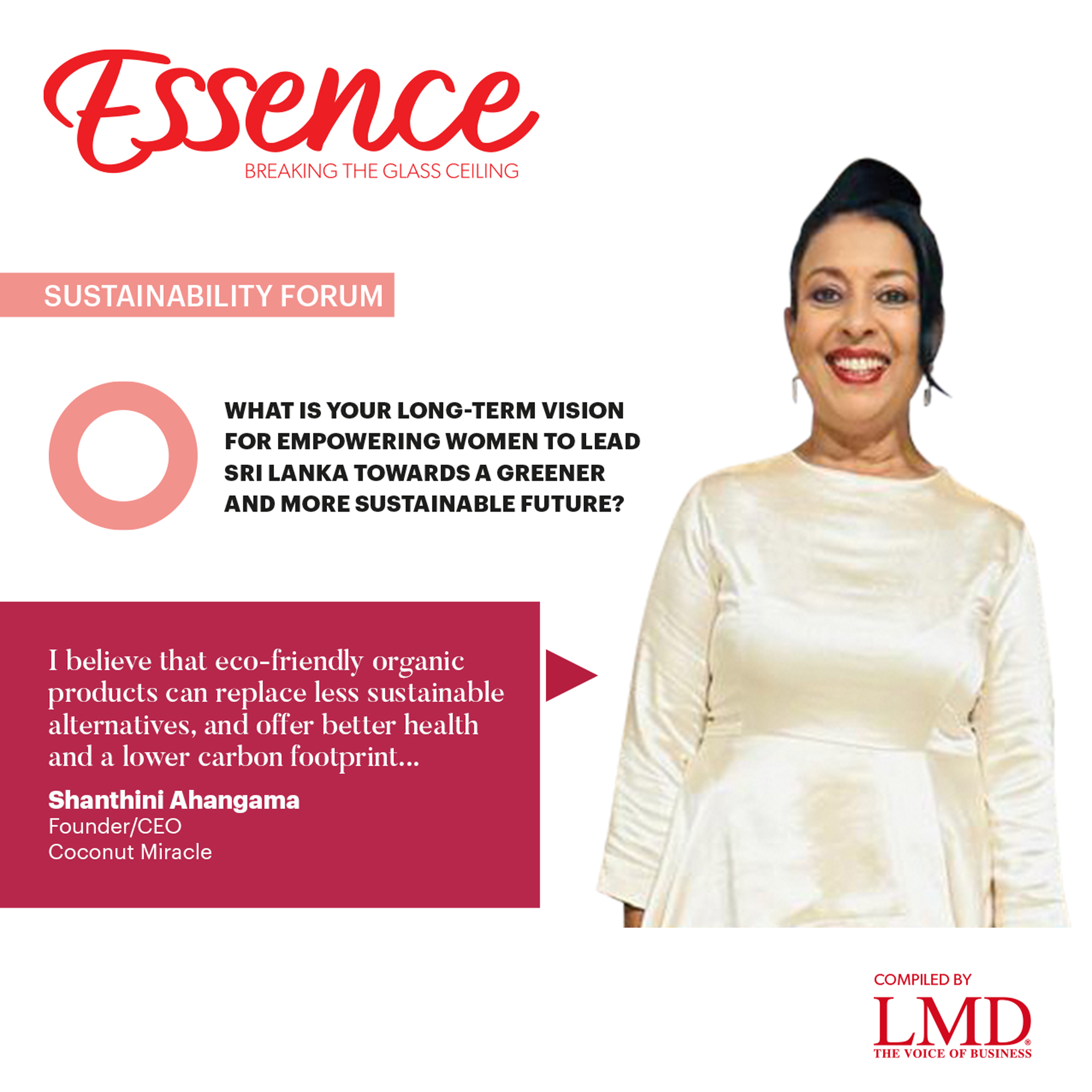ESSENCE PROFILE
PR Wire Sri Lanka
Q: What are your objectives and targets for gender equality and women’s leadership across different levels of the organisation?
Shehara Alahakoon (SA): Our main objective is to establish a culture where all team members, regardless of gender, feel valued and a part of something larger. By doing this, we will ensure that everyone has an equal opportunity to succeed.
A medium to long-term objective is to create a culture emphasising fairness and inclusion while celebrating diversity. By 2026, we want to achieve a level of female representation in executive management positions that is at least equal to 50 percent and increase the proportion of women in top management positions from current levels to 45 percent by 2025.
Our short-term goal is to reduce by five percent the number of people who leave their employment because of life events such as marriage, having children or moving house.
By giving female team members already employed in the organisation more autonomy and opportunity to advance their careers, it is possible to achieve the goal of increasing female representation in executive positions.
We have always offered new team members a learning atmosphere, and many who began their careers at PR Wire have made significant advancements and are now well equipped to take on leadership roles in the organisation.
“It is time for 21st century leadership, and the change is happening with the current ways of work, organisational structure and diversity pressure by the next generation
Q: There is a notion in society that contribution from male allies is less in terms of addressing the gender gap and women’s empowerment… What are your thoughts on this – and how does it relate to PR Wire?
Hansima Witharanage (HW): I cannot entirely agree that male allies of gender equality play a supporting role in the fight for gender parity. In reality, they contribute as significantly as their female colleagues do.
As far as PR Wire is concerned, our male team members have consistently been ardent supporters of women’s rights, and we have equality on every front including senior leadership and all other levels.
A proactive approach is taken to create a more welcoming workplace environment where women like me have equal opportunities and our contributions are valued for what we bring to the table.
Similar to how a jigsaw puzzle is incomplete without all of its pieces, the fight for gender equality cannot be won without all of its male allies’ full participation. As a result, we should celebrate their accomplishments while encouraging and empowering more men to join us, to create a just and fairer world for all.
Q: How is Sri Lanka faring regarding women’s representation in business?
HW: The lack of women in executive positions in Sri Lanka’s business world continues to be a process in progress. Even though they make up slightly more than half of the population, women only account for 7.8 percent of individuals in positions of authority in the commercial world.
This issue is not unique to Sri Lanka because there’s a global gender pay gap of 16 percent, and women occupy only 24 percent of senior management positions. Despite this, there has been a recent increase in conversations about promoting gender equality and diversity in the workplace.
Many of Sri Lanka’s most esteemed organisations have taken proactive steps to increase gender equality in the workplace – including publicising quotas for female employees, allowing for more flexible scheduling, and giving access to mentors and educational opportunities.
If we want to see more women in executive positions in business, we must endeavour to eliminate gender stereotypes, and provide access to positions of authority for both men and women in Sri Lanka..
Collaboration from enterprises, governments and citizens is required to accomplish this.
Q: Is the gender gap closing in Sri Lanka, in your assessment?
Krishanthi Dhayalan (KD): A recent UNDP research indicates that although women make up 52 percent of Sri Lanka’s population, they represent only 5.3 percent of the legislature.
Despite structural and economic limitations however, Sri Lanka is moving forward steadily. Future focussed organisations are implementing an inclusive culture, and creating initiatives to remove gender barriers and close skill gaps – because of global sustainability targets and an evolving digital landscape.
In Sri Lanka, women are driving progress in technology and sustainability. Empowered and skilled women’s community groups are developing easily accessible knowledge sharing platforms around the country.
Q: What are the most pressing challenges for women in the workplace today, and how can these be overcome?
KD: Maintaining regular working hours can be challenging for women who play multiple social roles. A flexible work environment, and a stronger focus on productivity and results, will boost employee deliverables.
It is wise to adopt an open-door (and ‘open-table’) policy where all opinions and recommendations are considered. The application of these concepts is then assessed to determine whether it reflects the organisation’s beliefs, goals and purpose.
Governmental and corporate bodies must adhere to a transparent compensation structure that reflects the nation’s economic and cultural demands.
In positions of power, women are undervalued globally in the decision-making process. To make decisions that will provide sustained outcomes, women have the skills to analyse, research and provide justifiable decisions before commitment.
Q: Apart from traditional ways (such as maternity leave) of supporting working women, what are businesses doing to help women maximise their potential?
Anjuu Bakshani (AB): Organisations can reap the most benefits from investing in women’s leadership development programmes. Their efforts to foster a flexible workplace that allows for a healthy work-life balance are crucial.
The potential and output can be maximised through incentives such as recognition and awards that pave the path for equal chances. Initiatives to promote mental and emotional health are especially important in the present atmosphere.

Head – Corporate, ESG and DEI
Q: In what ways have new working norms – for instance, working from home (WFH) – contributed to encouraging more women to join the workforce in Sri Lanka? What needs to be done to sustain this trend?
AB: Businesses should encourage and support a healthier work-life balance, and cultivate a flexible work environment so that employees can attend to personal obligations. Businesses need to create a culture of empathy, and offer care for children and adults as a support for working women.
They need to raise awareness and ensure the audience knows that such elasticity is provided in the recruitment advertising process.
Q: How well have Sri Lankan corporate boards adopted inclusion and diversity – especially regarding female representation?
Yusra Musthafa (YM): There is widespread agreement among organisations that they must adapt, and most have a well-defined plan. Initiatives to promote women’s empowerment and gender equality (such as providing daycare and other ways to be flexible at work) are gaining steam, which is a good sign.
The organisational governance structure needs to be more inclusive. For example, look at an organisation’s political and board representation: Why is there a need for more women? New norms of leadership levels, thoughts and most importantly, significant actions are needed.
It is time for 21st century leadership, and the change is happening with the current ways of work, organisational structure and diversity pressure by the next generation.
The estimation of 50 percent women’s representation in leadership and a women-led economy can become a reality only if concise thoughts, intent and actions can be matched. Even if not, social and generational pressure will push the paradigm shift. The meaning of employment, types of work we engage in and why we do it are continually changing – for both males and females. As members of society, we make equal contributions to its progress.
Q: What can organisations do to address the loss of women employees at mid-career?
YM: First and foremost, it is critical to educate and raise awareness throughout the organisation that it fully supports professional advancement at all times.
It is also the organisation’s responsibility to devise and implement plans to assist women in returning to work after maternity leave in a manner that is both successful and uncomplicated. In turn, this will create a sense of belonging and being valued, which is essential in all circumstances.
“Similar to how a jigsaw puzzle is incomplete without all of its pieces, the fight for gender equality cannot be won without all of its male allies’ full participation
Telephone 0773 714892
Email info@prwiresl.com
Website https://prwiresl.com/











